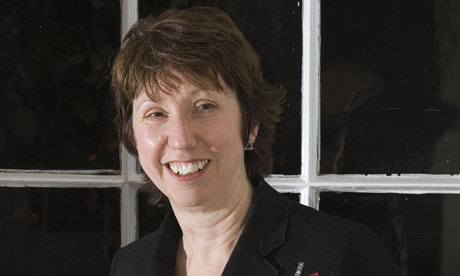Germany is planning to resist what it sees as British dominance of EU foreign policy within a new apparatus led by Lady Ashton. Photograph: Rex Features Germany is planning to stop what it sees as a British campaign to dominate European foreign policy-making under Lady Catherine Ashton, the Guardian can disclose. Amid growing criticism across the EU of the performance of Baroness Ashton of Upholland, the EU's new high representative for foreign and security policy, Berlin and Paris are alarmed at the prominence of British officials in the new EU diplomatic service being formed under Ashton. A confidential German foreign ministry document analysing the creation of the EU's new diplomatic service, seen by the Guardian, has concluded that Britain has grabbed an "excessive" and "over-proportionate" role. Berlin and Paris are anxious that they are losing the battle to win key positions in the new service which is to be the main vehicle for projecting European power globally under the Lisbon Treaty. Brussels is currently embroiled in tense negotiations to establish its first worldwide diplomatic corps and integrated foreign policy apparatus, known as the European External Action Service (EEAS). It is to be led byLady Ashton, the EU's new high representative for foreign and security policy. "Excessive GB participation [in the EEAS] is evident," says the German document. "Over-proportionate GB influence on the establishment [of the EEAS] and staffing is to be avoided." "There's clearly an anxiety in Paris and Berlin that the overall balance will be satisfactory," said Thomas Klau, a German analyst who heads the Paris office of the European Council on Foreign Relations. "No one has anything against good British candidates, but if it looks like a takeover, it's different." With Ashton coming under increasing attack across the EU for what is seen as weak and lacklustre performance as the EU's first foreign and security policy chief, Berlin and Paris fear they are being out-manoeuvred in the tussle for the posts which will shape the new regime. The Germans and the French point to the predominance of British figures in many of the pivotal positions in the new service. Senior sources complain that of the 12 staff appointed to Ashton's office, four are British, including her chief of staff and her private secretary. Additionally, British officials are conspicuous in heading several of the key departments crucial to the operation of the new service. These include the head of the EU's intelligence cell, its military staff, the official recently appointed to overseeing recruitment to what are to be more than 130 EU embassies abroad, as well as Robert Cooper, the EU's top foreign and security policy strategist. "The inroads to the decision-taking level are easier for the UK than for anyone else," said a former German diplomat closely following the politics behind the building of the EEAS. "A lot of people are very unhappy. But the French are the only ones doing something about this British dominance." A European Commission official said: "What are the French really complaining about? Everything comes back to the British, that it's all a British plot." Another EU official said: "It's a very highly charged political environment. It's getting very messy." The diplomats and officials declined to be named. The French contend that the inexperienced Ashton is being schooled in policy-making by the Foreign Office. Diplomats and officials in Brussels also see Britain's hand in one of Ashton's first appointments, made last week. She named Vygaudas Ušackas, a former Lithuanian foreign minister and ambassador in London, as the EU's special envoy to Afghanistan. He was widely seen as the UK's favoured contender after Britain withdrew its own candidate because it secured the post of Nato envoy in Kabul. The Germans are also increasingly unhappy at what they see as the erosion of their influence and being cut out of decision-taking. The EEAS, like Ashton's job, was created by the Lisbon treaty which came into force late last year and is aimed at streamlining EU decision-taking and enabling it to exercise greater political clout around the world through Ashton's "single voice" articulating common foreign and security policy. The EEAS is to supply the foreign policy machinery, converting 136 European Commission offices around the world into EU embassies. The Germans, who are the said sources, were incensed at not being consulted when Ashton turned 54 commission offices into EU embassies at the beginning of the year. Ashton has to decide and obtain agreement by the end of April on the fundamental structures, staffing, and budgets for the new service, not least because there are fears across Europe that a UK conservative government may enter office in May and could at best seek to delay its establishment.Germany and France dispute Lady Ashton's 'excessive' EU powers

Monday, 1 March 2010
• Confidential German ministry document reveals objections
• Alarm at Ashton's multiple appointment of British officials
Posted by
Britannia Radio
at
23:33
![]()





















